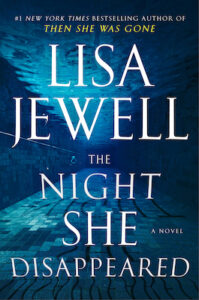I wrote my first book, Ralph’s Party, when I was a mere child of 27. I wrote it in a small apartment where I lived with my boyfriend and cat. On the days when I wasn’t writing, I was working as secretary in a human resources department. I wrote my nineteenth novel, The Night She Disappeared, at the grand old age of 52. I wrote it in my big house where I live with my husband, our two teenage daughters, dog and cat and there are no days when I’m not writing as I’m a full-time writer. My novels have changed as steadily and incrementally as my life has. In my twenties I was writing romantic comedies. In my mid-thirties, with two small children, I started to write more family-based mysteries and dramas, and in my forties I finally embraced the dark side and began to kill my characters. Most of my best novels, I genuinely believe, are my most recent novels, but then I should hope that I’d learn to be a better writer after twenty-five years and nineteen novels! But if you want some suggestions for exploring uncharted areas of my backlist, here are five of my favorites.
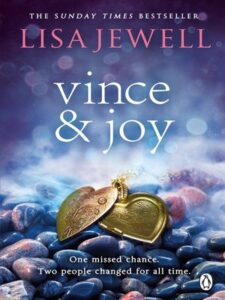
Vince & Joy
Vince and Joy lose their virginity to each other in a caravan park on holiday in the 80’s. Their paths diverge and they go out into the adult world, marry the wrong people and keep missing each other at poignant junctures. It’s my favorite by far of all my romance novels, full of colorful minor characters and lovely London-y set pieces.
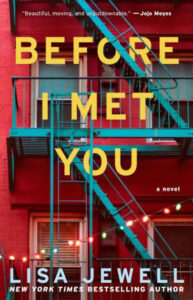
Before I Met You
Here I go is a bit Maggie O’Farrell—I was reading a lot of her ‘dual time frame’ novels at the time—and this was my homage. Arlette comes to London in 1919, just after the great war. Her granddaughter Betty comes to London in the 1990’s to try to find a mysterious beneficiary in Arlette’s will. It’s poorly researched, but very romantic, picturesque and mysterious.
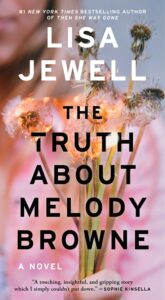
The Truth About Melody Browne
This was the book where I finally ditched the romance. Melody Browne is hypnotized at a stage show and afterwards keep getting flashbacks to a childhood she thought she’d forgotten after a house fire at nine years old. She follows the clues in her head to a seaside town on the east coast and slowly discovers who she really is.
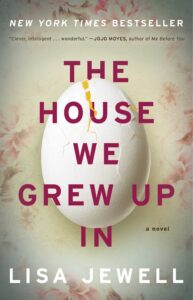
The House We Grew Up In
This is one of my absolute favorites and that rare thing which is a novel that was everything that I had hoped it would be when I set out to write it. The Bird family live in a chocolate box countryside idyll until something shocking happens one Easter Sunday and the family falls apart. Twenty-five years later and Lorelei, the matriarch is dead, leaving her four children to come together to clear out her hoarded home.

I Found You
It’s hard to choose just one of my thrillers to recommend, I like them all equally. But this one is a nice mixture of mystery and romance, liberally seasoned with moments of darkness and depravity, all set in a beautiful northern seaside town. It has memory loss, flashbacks, big houses and loads of great dogs. It also has Alice, who is probably my all-time favourite of all my female characters.
***
And before you go…here’s a bonus Q&A where Lisa Jewell answers a few questions from CrimeReads:
CR: Are there characters you didn’t much enjoy when you first wrote them, but have a new appreciation for now?
LJ: That’s a hard question to answer. I usually enjoy writing the ambiguous characters the best, the damaged ones, the dark ones. I find writing characters who are deliberately unambiguous—say, for example, Libby in the Family Upstairs, or Sophie in The Night She Disappeared, much less satisfying. It feels like there’s nowhere to go with them, no secrets or dark motives waiting to be unveiled. But then readers come to me and say how much they loved these ‘nice’ characters, how they related to them and rooted for them and that, I guess, gives me a new appreciation for them.
CR: What are some of the thrillers you turned to for inspiration when you first started going darker with your books?
LJ: I think maybe the most formative book for me as a writer of psychological thrillers was a book I read before I even started writing novels at all—The Collector by John Fowles. Having been so inspired by it I had assumed that my first novel would be a dark tale of twisted obsessive love, but it didn’t turn out that way. Then about ten years ago, I read After You’d Gone by Maggie O’Farrell and that reignited my urge to write something darker and more layered.
CR: Do you already know what #20 is going to be?
LJ: Absolutely! I finished writing The Night She Disappeared in December of 2020, so I’m well into writing the 20th by now, and it should hopefully be finished by the end of the year. It’s a sequel to my 17th novel, The Family Upstairs and follows Henry and Lucy from the first book. It doesn’t have a title as yet.
CR: How has your writing process changed over 25 years of crafting fiction?
LJ: It’s not so much that my process has changed, more that I’ve come to accept the way I write and work with it rather than against it. I always used to think I should be more organized, more focused, that I should plan more and have more of a handle on what the book was about and what was going to happen. I used to question myself a lot and do a lot of reading backwards and rethinking and rewriting. Now I’ve learned to trust my instincts and write in a more positive, dynamic way, using forward momentum to keep the plot unfurling onto the page without trying to control it.
CR: Are there genres you have yet to take on that you’re interested in exploring in future books?
LJ: No, definitely not. The beauty of writing thrillers is that they can be set at any time, in any place and with any number or type of person, there’s no formula involved and thus it feels almost like I’m not writing in a genre at all, I’m just writing books about situations, places and people that interest me. It never feels like I’m in a rut that I need to break out of, or that there are other genres waiting to be explored. Writing thrillers gives me everything I need.
***


